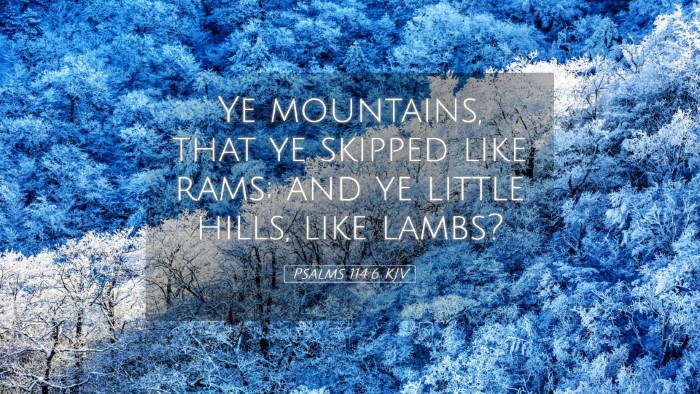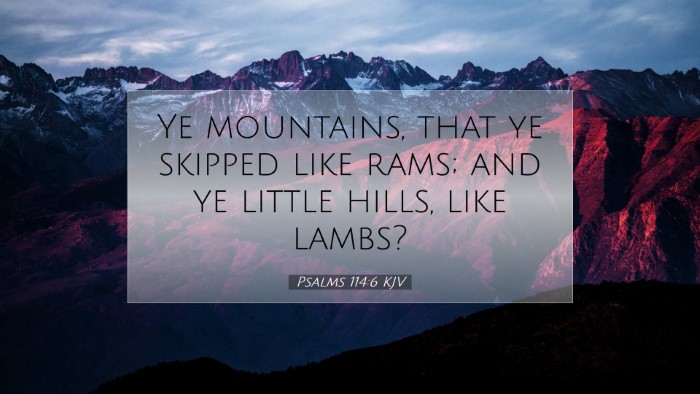Commentary on Psalms 114:6
Bible Verse: Psalms 114:6 - "Ye mountains, that ye skipped like rams; and ye little hills, like lambs?"
Overview
This verse is a part of Psalms 114, where the psalmist reflects on God's mighty acts during the Exodus and His majestic power over nature. This particular verse personifies mountains and hills, portraying them as creatures that exhibit emotions, such as skipping and leaping in response to God's presence.
Contextual Analysis
The context of Psalms 114 depicts a remarkable moment of transformation when Israel was led out of Egypt. It contrasts the power of God with the natural elements. The psalm opens with an emphasis on the greatness of the Lord's departure from Egypt and the miraculous crossing of the Red Sea and Jordan River.
Theological Insights
This verse encapsulates several theological themes that are fundamental to the understanding of God's interaction with His creation:
- The Sovereignty of God: The imagery of mountains skipping and hills leaping illustrates God's absolute sovereignty over nature. Mountains, often symbols of immovability and strength, react joyfully to God's command, highlighting His omnipotence.
- The Joy of Creation: The personification of mountains and hills imbues creation with sentience, suggesting that the natural world rejoices in God's deliverance of His people. This reflects the biblical ideal that all creation is affected by the redemptive actions of God.
- God's Deliverance: The leaping of the mountains acts as a metaphor for the great works of God during the Exodus narrative. It serves as a reminder of God's faithfulness to His covenant and the joyous response it elicits from nature.
Commentary Insights
Matthew Henry
Matthew Henry observes that the skipping of the mountains signifies a profound change in nature when encountering God's might. He emphasizes that such manifestations of God's power remind us of His ability to intervene in human affairs and nature itself. He writes, "The mountains, once steadfast, show that God's presence transforms all in its wake, leading us to consider our spiritual lethargy compared to nature's responsiveness."
Albert Barnes
Barnes elaborates on the metaphorical implications of this verse, indicating that the mountains represent the unshakable forces in life. He notes that even the strongest elements of nature cannot stand against God's powerful acts. This challenges believers to recognize God's ultimate authority in their lives, turning to Him in times of struggle and uncertainty, as he states: "If even the mountains are moved by His presence, how much more should we be affected by His grace?"
Adam Clarke
Adam Clarke offers a more detailed exegesis of the natural phenomena mentioned in this verse. He remarks on how the language of skipping is an expression of joy and excitement, evoking the response of animals. Clarke points out the poetic nature of the psalm, using playful imagery to illustrate profound truths about God's nature, saying, "Here, the Divine influence is portrayed as so mighty that even inanimate objects echo the joy of His people." He encourages readers to contemplate their response to God’s works, drawing parallels to how nature rejoices.
Practical Applications
For pastors, students, and theologians, this verse and its commentary have several practical applications:
- Worship and Response: Engage in worship that embodies the joy of God's mighty acts, recognizing how creation itself rejoices and reflects God's glory.
- Faith and Trust: Encourage believers to trust in God's sovereignty over their lives, even when circumstances seem immovable or unchangeable.
- Creation Care: Highlight the interconnectedness of creation and redemption, inspiring stewardship of the environment as a response to God’s works.
- Community Reflection: Foster discussions within church communities about how God's acts in history should inspire present-day faith and actions.
Conclusion
Psalms 114:6 serves as a rich tapestry illustrating God's power and the glad response of nature to His presence. The insights from renowned commentators like Matthew Henry, Albert Barnes, and Adam Clarke remind us of the significance of God's intervention in history and its implications for us today. As we reflect upon this verse, let us be inspired to live lives of worship and trust, rejoicing like the mountains in response to the grandeur of our Creator.


